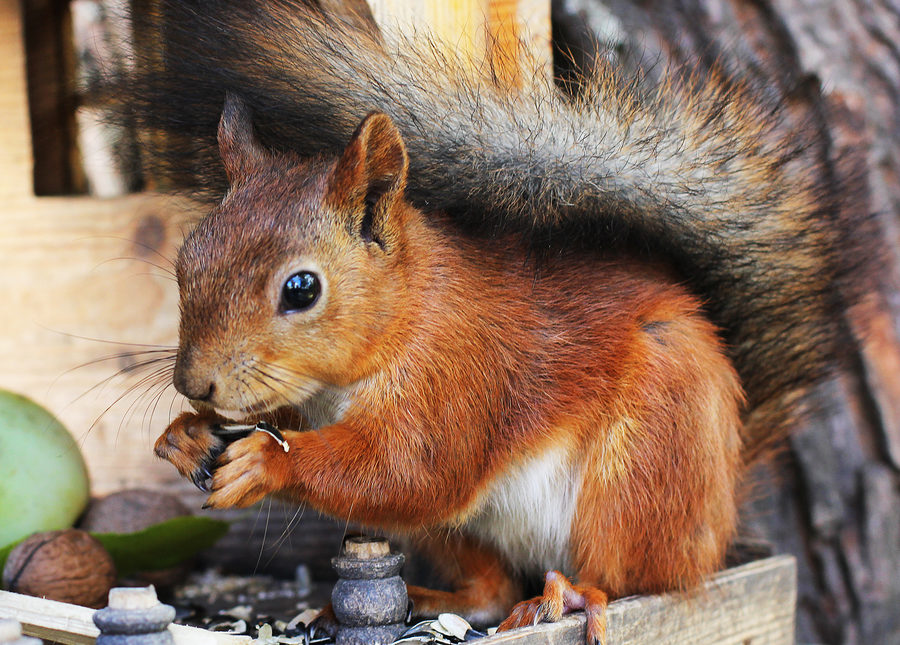Today is National Squirrel Appreciation Day!
Every year on January 21, nature lovers across the United States celebrate National Squirrel Appreciation Day. Organized in 2001 by wildlife rehabilitator Christy Hargrove, this day serves as a gentle reminder of how vital squirrels are to our ecosystems and how we can coexist with them peacefully. Whether you’re a fan of observing their acrobatics or simply want to support your local wildlife, there’s so much to discover about these furry critters.
This post dives into why squirrels matter, the fascinating facts about them, and how to make the most of National Squirrel Appreciation Day—all while emphasizing safe and humane ways to deal with nuisance squirrels.

The Importance of Squirrels Among Earth’s Ecosystems
Though they might seem like everyday backyard visitors, squirrels play an essential role in maintaining healthy ecosystems. One of their most notable contributions is their role as accidental tree planters. When squirrels bury nuts and seeds to save for later, they often forget about some of their stashes. These forgotten seeds germinate into trees, helping forests regenerate naturally.
Other ecological contributions include:
- Dispersing seeds and spreading biodiversity.
- Acting as prey for predators like owls, hawks, and foxes, helping maintain balance in the food chain.
- Aerating soil as they dig holes for burying and retrieving nuts.
Without squirrels, the balance in many ecosystems would suffer.
Squirrel Species Found in Tennessee
If you’re in Tennessee, you’re lucky enough to encounter a variety of squirrel species. Each comes with its own unique features and quirks. Here are four species you’re likely to find in the Volunteer State:
1. Eastern Gray Squirrels
The most commonly spotted species in Tennessee, Eastern Gray Squirrels, are known for their agility and playful nature. They’re excellent climbers and are a delight to watch during their daily scurrying.
2. Fox Squirrels
Larger than Eastern Grays, Fox Squirrels are often reddish-brown and favor open woodlands over urban parks.
3. Southern Flying Squirrels
Not often seen due to their nocturnal habits, these tiny, wide-eyed squirrels glide from tree to tree using a membrane between their limbs.
4. Red Squirrels
Known for their territorial behavior, these squirrels have a striking reddish coat and are slightly smaller than their gray and fox counterparts.
Now that you know who’s hiding in your trees, it’s time to look at some fascinating tidbits about them.
Interesting Facts About Squirrels
- Squirrels have exceptional memory, which helps them retrieve buried food.
- Their teeth never stop growing, so they chew on hard objects like tree bark to keep their incisors in shape.
- Flying squirrels don’t actually fly—they glide using a cartilage-supported membrane called a patagium.
- A group of squirrels is called a scurry.
- Squirrels can leap up to 10 times their body length in a single bound!
Fascinated yet? There’s even more to appreciate, especially on National Squirrel Appreciation Day.
How to Celebrate National Squirrel Appreciation Day
Looking to make January 21 special? Here are some fun and thoughtful ways to celebrate the day and support your local squirrel population.
- Set Up Squirrel Feeders: Fill feeders with healthy squirrel snacks like unsalted nuts, chopped apples, and sunflower seeds.
- Start a Squirrel Watching Guide: Grab a notebook and document the behaviors, species, and feeding habits of the squirrels in your area.
- Plant Trees: Help squirrels—and the planet—by planting native trees that provide shelter and food.
- Visit a Nature Reserve: Spend the day observing squirrels in their natural habitats.
Squirrel Watching and Feeding: A Beginner’s Guide
Squirrel feeding and watching can bring you closer to these tiny creatures, but here are some tips to ensure it’s beneficial for you and them.
Feeding Tips
- Choose Nutritious Foods: Stick to squirrel-healthy options like acorns, pecans, or pumpkin seeds. Avoid processed foods like bread or salted nuts.
- Don’t Overfeed: Balance is key to avoid disrupting their natural foraging habits.
Watching Tips
Find a cozy spot in your backyard or a nearby park with plenty of squirrel activity. With a little patience, you can observe fascinating behaviors like burying nuts or chasing each other.
Safe and Humane Squirrel Control Efforts
Love them or not, squirrels sometimes become uninvited guests in attics or gardens. If you’re dealing with nuisance squirrels, it’s essential to handle the situation humanely.
- Seal Entry Points: Inspect your home to ensure there are no gaps or holes where squirrels can sneak in.
- Use Squirrel Repellents: Natural deterrents like cayenne pepper can keep them out of gardens without harm.
- Install Squirrel-Proof Bird Feeders: Invest in bird feeders that prevent squirrels from snatching birdseed.
- Trust the Pros: Call a licensed and insured wildlife control professional for persistent issues to handle the situation ethically.
Remember, there are ways to coexist with these critters without causing harm.
Final Thoughts
National Squirrel Appreciation Day isn’t just about celebrating these nutty animals; it’s about fostering appreciation for nature and supporting the ecosystems we share with wildlife. By taking steps like setting up squirrel feeders, engaging in humane squirrel control, or even planting a tree, you’re contributing to a healthier and more harmonious planet.
Want to do more? Consider joining a local wildlife association or supporting conservation efforts in your community. Even small actions make a big difference.
Are you dealing with some nuisance squirrels around your Tennessee property? Contact Budget Animal Removal at 615-337-9165 for TWRA licensed and insured Nashville, Tennessee animal removal for squirrels, chipmunks, and more. We serve commercial clients too.
Related Posts:
Say Goodbye to Those Agile Critters with These Effective Squirrel Control Tips
Winning the War Against Garden Squirrels: Proven Tactics
Common Household Ingredients That Will Repel Nuisance Wildlife


